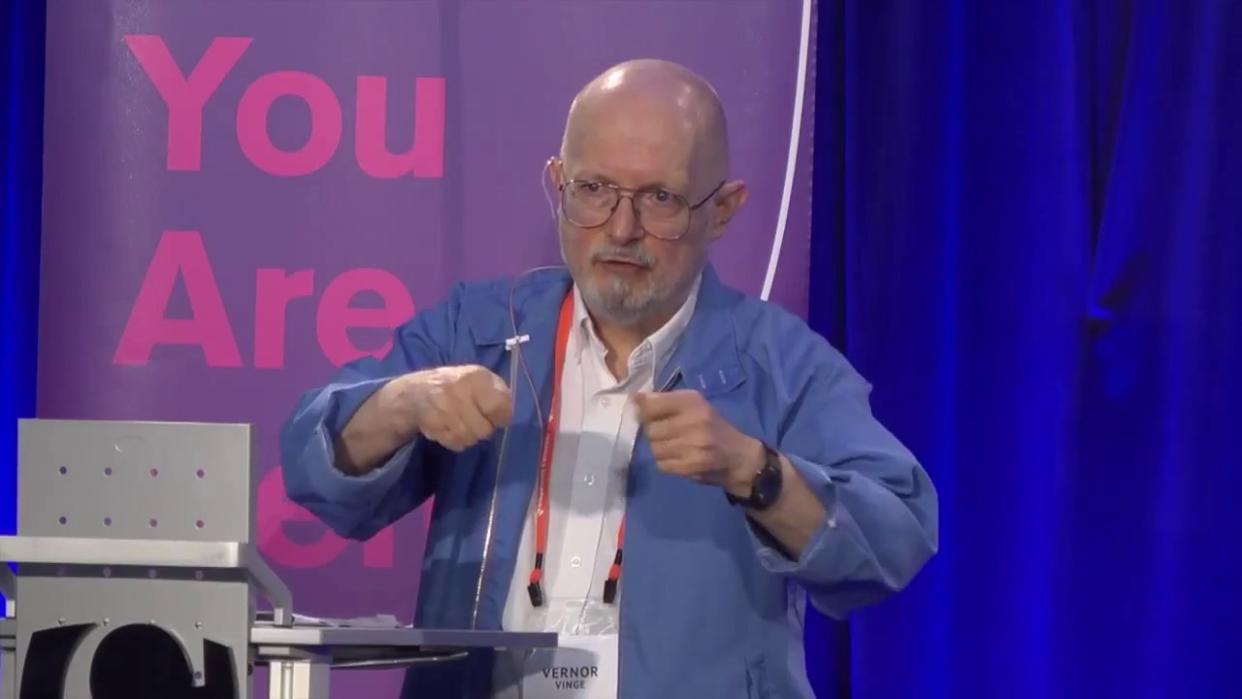Vernor Vinge Dies: Hugo Award-Winner Credited With Insights Into ‘The Singularity’ And ‘Cyberspace’ Was 79

- Oops!Something went wrong.Please try again later.
- Oops!Something went wrong.Please try again later.
- Oops!Something went wrong.Please try again later.
Vernor Vinge, whose expansive science fiction brought the concepts of The Singularity and cyberspace to a wider audience, died from Parkinson’s disease at age 79 on March 20 in La Jolla, California. The confirmation came in a Facebook tribute from fellow author David Brin.
“A titan in the literary genre that explores a limitless range of potential destinies, Vernor enthralled millions with tales of plausible tomorrows, made all the more vivid by his polymath masteries of language, drama, characters, and the implications of science,” wrote Brin.
More from Deadline
Hollywood & Media Deaths In 2024: Photo Gallery & Obituaries
Hollywood & Media Deaths In 2023: Photo Gallery & Obituaries
Cass Warner Dies: Filmmaker, Granddaughter Of Harry Warner, Mother Of Cole Hauser Was 76
Vinge won Hugo Awards for his novels A Fire Upon the Deep (1993), A Deepness in the Sky (2000), and Rainbows End (2007). He also won Hugos for novellas Fast Times at Fairmont High (2002) and The Cookie Monster (2004).
Vinge’s novella True Names (1981) is frequency cited as the first presentation of an in-depth look at the concept of “cyberspace.”
The author first presented the term “singularity” in 1983, borrowed from the concept of a singularity in spacetime in physics.
In a 1983 op-ed in OMNI magazine, Vinge wrote, “When this happens, human history will have reached a kind of singularity, an intellectual transition as impenetrable as the knotted space-time at the center of a black hole, and the world will pass far beyond our understanding.”
In 1993, he emphasized his points in an essay titled The Coming Technological Singularity: How to Survive in the Post-Human Era.
The singularity concept claims AI will soon become super-intelligent, far surpassing humans in capability and bringing the human-dominated era to a close.
Brin wrote, “Accused by some of a grievous sin—that of ‘optimism’—Vernor gave us peerless legends that often depicted human success at overcoming problems,” Brin wrote. “Those right in front of us… while posing new ones! New dilemmas that may lie just ahead of our myopic gaze. He would often ask: ‘What if we succeed? Do you think that will be the end of it?'”
Vinge’s concept influenced futurist Ray Kurzweil, who has written about the singularity several times at length in books such as The Singularity Is Near in 2005.
In a 2005 interview with the Center for Responsible Nanotechnology website, Kurzweil said, “Vernor Vinge has had some really key insights into the singularity very early on. There were others, such as John Von Neuman, who talked about a singular event occurring, because he had the idea of technological acceleration and singularity half a century ago. But it was simply a casual comment, and Vinge worked out some of the key ideas.”
DEADLINE RELATED VIDEO:
Best of Deadline
Hollywood & Media Deaths In 2024: Photo Gallery & Obituaries
2024 Premiere Dates For New & Returning Series On Broadcast, Cable & Streaming
Step & Repeat Gallery: The Best Red Carpet & Party Photos Of 2024
Sign up for Deadline's Newsletter. For the latest news, follow us on Facebook, Twitter, and Instagram.

